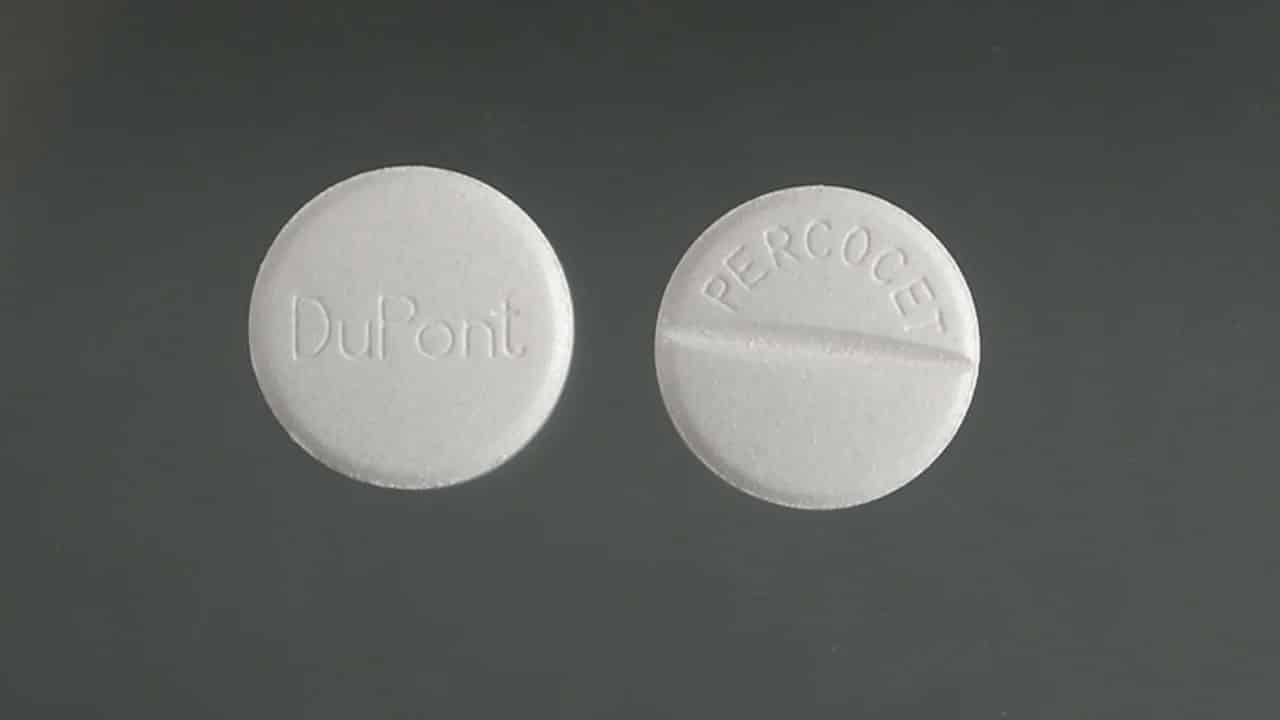Percocet is a painkiller. Its two chief ingredients are 2.5 milligrams of oxycodone hydrochloride and 325 milligrams of acetaminophen. The tablets also have various nonmedicinal ingredients. Percocet is a painkiller with similar properties to morphine. Because it’s generally metabolized more quickly and predictably than morphine, it’s most often the painkiller of choice. Sometimes, it’s contraindicated, such as in cases of breathing difficulties, liver problems, or certain inhibitors and inducers. Legitimate use is as prescribed. Sometimes, after checking with your doctor, you can take an extra tablet when the pain isn’t reduced, but this is only on a case-by-case basis. In rare cases, Percocet can also act as a breakthrough medication against someone’s pain threshold. Illegitimate use is anything else.

Table of Contents
Percocet’s Composition and Effects
Oxycodone hydrochloride is an agonist that blocks pain receptors in the body. The term for its effect is analgesia. Its effect is similar to that of morphine. The three kinds of pain receptors that it affects are delta, kappa, and mu. It also has an effect on respiration. For this reason, its use is contraindicated in cases where the person has breathing problems. Acetaminophen is also an analgesic, but its effect is weaker than that of oxycodone hydrochloride. Like other pain medications, such as acetylsalicylic acid, its mechanism of action is still unknown.
In addition to being an agonist and analgesic, Percocet is a central nervous system depressant. That’s why is sometimes has a detrimental effect on breathing. Folks dealing with Percocet use or involved in opioid use improperly often chase the “high,” which is the euphoric effect the drug produces as a side effect. Others use it improperly to avoid the unpleasantness of withdrawal.
The Path to Percocet Addiction
Pain sucks. People who suffer chronic pain need relief from that pain. And it’s not just pain from cancer either. Many conditions cause chronic invisible pain. Idiopathic intracranial hypertension, or IIH, is one of those conditions. The migraines and terrible back pain from the increased spinal fluid pressure need relief. Although most folks who misuse Percocet do so for the euphoria, it’s possible to become addicted even if you’re using the medication properly. Therefore, it’s always advisable to talk about your pain management strategy with your doctor. With debilitating pain, sometimes, Percocet or similar pain medications are necessary.
Unfortunately, as you use Percocet, you develop tolerance to its effects. If 2.5 milligrams controlled your chronic pain in the beginning, it might not continue to do so several months down the road. The idea is to increase the dosage under your doctor’s care and only increase it enough so that you can control the pain. If someone has suffered severe pain for months or years, then that person’s dosage would be much higher than someone whose pain journey has just started.Signs of possible opioid addiction include borrowing or stealing money to get Percocet, using it even if it’s produced bad effects in the past, and even trying to steal the medication itself.

Why Medical Detoxification Is Essential
Depending on how long you’ve taken Percocet, quitting cold turkey could kill you from shock. Most people, though, won’t be in that situation. Still, the Percocet withdrawal symptoms can be dangerous. Diarrhea, for example, can cause dehydration, as can vomiting. Both together might even require IV fluids to treat. Severe dehydration can also create hypernatraemia, which is an elevated sodium level in the blood that can lead to sudden cardiac death. Milder symptoms include insomnia and the inability to feel pleasure. Also, if the person has legitimate chronic pain, a cold-turkey quit will exacerbate that pain, likely causing relapse.
It’s much safer and less brutal to go through a planned medical detox that will taper you off of the medication slowly. That will also allow your doctor to come up with another pain treatment program strategy. The team of medical professionals overseeing your detox can also catch the signs of hypernatraemia and other possibly lethal conditions and take steps to mitigate their risks or even alleviate those risks completely.
Challenges Encountered During Percocet Detox
First, pregnant people should know that they should not go through detox while pregnant. Doing so can cause premature delivery or even miscarriage. It’s not a good situation at all, but the least dangerous course of action is to treat opioid dependence with methadone maintenance.
Symptoms of Percocet withdrawal from long-acting opioids, such as Percocet, usually last a period of time of about three weeks. In addition to the aforementioned physical symptoms, people going through this Opioid withdrawal will experience cramps, watery eyes, runny nose, physical dependence, cravings, and some mental illnesses or psychological symptoms like anxiety. They’ll flash hot and cold. The medical observation is necessary to prevent severe dehydration. It’s a chore to drink 3 liters of water in a day under the best of circumstances, but when going through withdrawal, it’s worse. Still, it’s necessary to stave off the dehydration.
In some cases, the person’s withdrawal will be unusually severe. In these cases, it might be necessary to use supportive drugs like buprenorphine, clonidine, or other adrenergic agonists. The drug use will mitigate the vomiting, diarrhea, tearing, and runny nose, but they might also cause low blood pressure and dizziness. The team doing the monitoring must be alert to these side effects and take appropriate action when necessary.
The controlled environment is useful when helping people develop good habits and healthy patterns. The support is helpful for the person’s mental health. Together, they provide a baseline for the following rehabilitation.
Life After Detox: Embracing Rehabilitation
Therapy is an important part of the detox process. The good behaviors and patterns that begin during detox must be reinforced, and you have to learn new coping strategies. If you still suffer from chronic pain, then your doctor will have to find another way for you to control that pain, too. Think of therapy as a “mental detox program.” If you’ve been addicted, then you’ve developed detrimental thought processes and habits. Therapy helps you unravel those bad habits and thoughts, create coping strategies, and come up with life-altering plans for the future.
You can take up new hobbies, for example, to refocus your energy, thoughts, and time into beneficial pursuits. Another way that people can gain that focus is to mentor other people with substance use disorder, turning a frightful experience into something positive. Becoming the same kind of support that you received when you needed it is its own reward.
In fact, group and family therapy are as integral to the healing and recovery process as one-on-one therapy. Shared experiences breed extra support because you don’t feel alone in your struggle against substance abuse. Knowing that your family cares and supports you is also nurturing. You certainly don’t have to undertake your journey alone. Remember, recovery is a lifelong process. You never stop being an addict. You merely learn to cope and to control the addiction rather than letting it control you.
How Addiction Treatment Centers Provide Holistic Care
Treating the entire client is crucial to someone’s success during recovery. Treating just the symptoms doesn’t work. The holistic method combines strong medical support with equally strong mental healthcare. Physical and psychological addiction go hand in hand. You can’t treat one without addressing the other and still have a successful outcome.
Providing opportunities for ongoing group support can also be hugely beneficial. It doesn’t even have to be a 12-step program to be a successful endeavor. Of course, 12-step programs have been successful for more than 100 years, so they’re eminently worthwhile. But other groups can be equally successful. Those in recovery should have access to all kinds of support groups and treatment options that meet their needs, and giving them those opportunities is one of the keys to a bright future for them.
Conclusion
If you’re suffering from Percocet abuse, any type of prescription drug addiction, or drug abuse, don’t go it alone, not for the least of reasons that doing so can be dangerous and even life-threatening. Also, even if you don’t experience those dangerous situations, having help and support along the way is a much better trip than traveling the road to recovery alone. So, if you have substance use disorder, or you know someone who does, then contact providers like Allure Detox, a detox facility/detox center, anytime to get help either for yourself, a friend, or a loved one’s well-being and aftercare program.
What Our Clients Say About Us
FAQ
What does Percocet look like?
How long does it take to become addicted to Percocet?
How long to detox from Percocet?
What are the withdrawal symptoms from Percocet?
Is Oxycodone the same as Percocet?
How do I quit Percocet cold turkey?
Published on: 2019-06-20
Updated on: 2024-01-03



